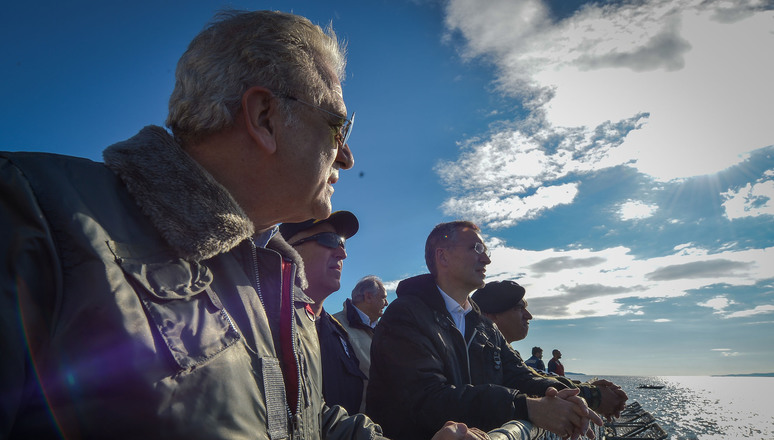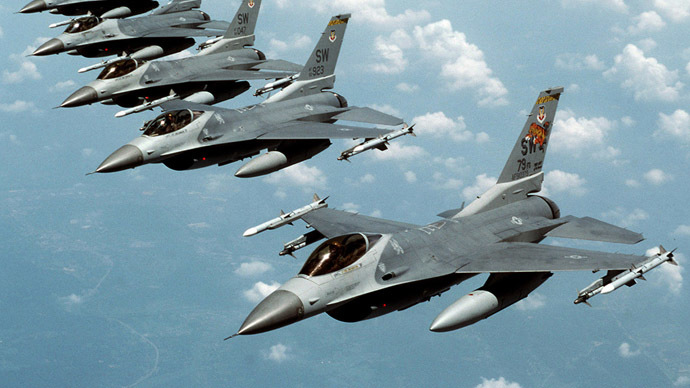NATO says Russian jets, bombers circle Europe in unusual incidents
 MiG-31
fighter jets are not commonly seen close to Europe but some were
intercepted along with other aircraft above the Baltic Sea in two
separate incidents on Tuesday and Wednesday. (Ilya Naymushin/Reuters)
MiG-31
fighter jets are not commonly seen close to Europe but some were
intercepted along with other aircraft above the Baltic Sea in two
separate incidents on Tuesday and Wednesday. (Ilya Naymushin/Reuters)
MOSCOW —
NATO said Wednesday that it had intercepted a large number of Russian
aircraft flying close to European airspace in the past two days, in an
“unusual” series of incidents that brought Russian bombers as far afield
as Portugal.
The aircraft — at least 19 in all — offered
reminders of Russian air power at a time of the worst relations between
the West and Russia since the Cold War. Russian military aircraft have
significantly increased their activity in Europe since the conflict in
Ukraine began earlier this year, with NATO scrambling to intercept
aircraft more than 100 times in 2014. But a NATO official said the scale
of the latest incidents was the most provocative this year.
Over
the Atlantic Ocean and the North, Black and Baltic seas, Russian
bombers, fighter jets and tanker aircraft were detected flying in
international airspace, NATO said. There were no incursions into
national airspace, a violation of sovereignty that would have
significantly amplified the seriousness of the four incidents, three of
which took place on Wednesday.
“We’re raising it as an unusual
level of activity,” said Lt. Col. Jay Janzen, a spokesman for NATO’s
military command in Mons, Belgium. “The flights we’ve seen in the last
24 hours, the size of those flights and some of the flight plans are
definitely unusual.”
U.S. officials regard the flights as a show
of force by the Putin government. “It’s concerning because it’s moving
in the wrong direction,” said one U.S. defense official, speaking on the
condition of anonymity because he was not authorized to discuss the air
activity publicly. “It’s not helping to de-escalate the situation in
Ukraine. It’s not helping to improve relations between NATO and Russia.
It’s not helping anybody.”
Smaller-scale incidents have also increased this year, approximately tripling from the same period in 2013, Janzen said.
In
at least one of the four incidents, the aircraft had switched off their
transponders and had not filed flight plans with civilian air traffic
controllers. That means that civilian air traffic control cannot track
them, potentially creating a risk for civilian planes.
That
incident took place around 3:00 a.m. in Western Europe on Wednesday,
when four Tu-95 long-range strategic nuclear bombers and four Il-78
tanker aircraft flew over the Norwegian Sea. Norwegian F-16 fighter jets
scrambled to intercept them. Six of the planes returned to Russia, but
two of the bombers skirted the Norwegian coast, flew past Britain —
sending Typhoon fighter jets to scramble in response — and then finally
looped west of Spain and Portugal, attracting Portuguese F-16s. Then the
two bombers appeared to return to Russia, Janzen said.
The Tu-95
bombers are not commonly seen close to Europe, Janzen said. Nor are the
MiG-31 fighter jets that were intercepted along with other aircraft
above the Baltic Sea in two separate incidents Tuesday and Wednesday. It
was not immediately clear whether the two incidents above the Baltic
represented the same group of seven planes entering and departing a
Russian military base at Kaliningrad.
There was no immediate reaction from the Russian government.
Fighter
jets from Norway, Britain, Portugal, Turkey, Germany, Denmark, Finland
and Sweden were involved in responding to the Russian aircraft, Janzen
said. Finland and Sweden are not members of NATO, and they have long
refrained from joining the defensive alliance, which was formed after
World War II as a bulwark against the Soviet Union.
But
military incidents with Russia this year have caused both countries to
start to reevaluate their positions. Most recently, the
Swedish military last week spent several days searching a
vast territory for an unidentified underwater craft suspected to be
Russian. Last month, Sweden said two Russian military planes had
violated its airspace.
A Novus opinion poll released Tuesday found for the first time that more Swedes favored joining NATO than opposed it.
The
most recent violation of NATO airspace was last week, when a Russian
spy plane flew almost 2,000 feet into Estonian airspace. This year, NATO
increased its air patrols based in the Baltics from four to 16 jets, a
measure of the newly hot confrontation between the two military
juggernauts.
The incidents appear to have set European militaries
on edge this week. British fighter jets were scrambled Wednesday to
bring a civilian Antonov cargo jet into a London airport; it stopped
responding to radio calls from air traffic controllers while flying over
the British capital. That caused a supersonic boom that was audible
across a large stretch of southeastern England.
Missy Ryan contributed to this report.







![[linked image]](http://defenceline.gr/images/11_pyrpol_2014.jpg)

















